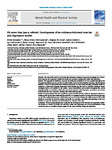It's more than just a referral: Development of an evidence-informed exercise and depression toolkit
| dc.contributor.author | Glowacki, K | |
| dc.contributor.author | Arbour-Nicitopoulos, K | |
| dc.contributor.author | Burrows, M | |
| dc.contributor.author | Chesick, L | |
| dc.contributor.author | Heinemann, L | |
| dc.contributor.author | Irving, S | |
| dc.contributor.author | Lam, RW | |
| dc.contributor.author | Macridis, S | |
| dc.contributor.author | Michalak, E | |
| dc.contributor.author | Scott, A | |
| dc.contributor.author | Taylor, Adrian | |
| dc.contributor.author | Faulkner, G | |
| dc.date.accessioned | 2020-09-19T08:16:06Z | |
| dc.date.available | 2020-09-19T08:16:06Z | |
| dc.date.issued | 2019-10 | |
| dc.identifier.issn | 1755-2966 | |
| dc.identifier.issn | 1878-0199 | |
| dc.identifier.other | 100297 | |
| dc.identifier.uri | http://hdl.handle.net/10026.1/16397 | |
| dc.description.abstract |
Objective: The aim of this article is to describe this systematic and phased process in developing the evidence-based ‘Exercise and Depression Toolkit’ for health care providers working with adults with depression. Methods: The Appraisal of Guidelines, Research and Evaluation (AGREE) II tool was consulted throughout the developmental phased process, and used to guide toolkit content and dissemination strategies. The four phases included a review of relevant literature, formative interviews, an expert panel meeting, and finally toolkit development. A Theoretical Domains Framework (TDF) analysis was also used to determine behaviour change techniques (BCT) to be included in the toolkit. Various stakeholders were involved throughout the process including health care providers, adults who have lived experience with depression, researchers, and exercise professionals who have experience working with adults with depression. Results: Recommendations from the consultation process included that the toolkit be ‘depression tailored’ including specific barriers that adults with depression face to engaging in physical activity (PA) and strategies they can use. The toolkit should promote collaboration and a person-centered approach. Different parts of the toolkit should be created for the intended audience of health care providers and adults with depression. BCTs were included to target the ‘Emotion’ and ‘Social Influences’ domains of the TDF. Conclusions: These recommendations have resulted in the development of the ‘Exercise and Depression Toolkit’. This toolkit is a resource for health care providers, adults with depression, and exercise professionals to help exercise become an accessible treatment option for the many Canadians living with depression. | |
| dc.format.extent | 100297-100297 | |
| dc.language | en | |
| dc.language.iso | en | |
| dc.publisher | Elsevier BV | |
| dc.subject | Exercise | |
| dc.subject | Depression | |
| dc.subject | Toolkit | |
| dc.subject | Evidence-based | |
| dc.subject | Knowledge translation | |
| dc.subject | Behaviour change | |
| dc.title | It's more than just a referral: Development of an evidence-informed exercise and depression toolkit | |
| dc.type | journal-article | |
| dc.type | Journal Article | |
| plymouth.author-url | https://www.webofscience.com/api/gateway?GWVersion=2&SrcApp=PARTNER_APP&SrcAuth=LinksAMR&KeyUT=WOS:000501403700005&DestLinkType=FullRecord&DestApp=ALL_WOS&UsrCustomerID=11bb513d99f797142bcfeffcc58ea008 | |
| plymouth.volume | 17 | |
| plymouth.publication-status | Published | |
| plymouth.journal | Mental Health and Physical Activity | |
| dc.identifier.doi | 10.1016/j.mhpa.2019.100297 | |
| plymouth.organisational-group | /Plymouth | |
| plymouth.organisational-group | /Plymouth/Faculty of Health | |
| plymouth.organisational-group | /Plymouth/Faculty of Health/Peninsula Medical School | |
| plymouth.organisational-group | /Plymouth/REF 2021 Researchers by UoA | |
| plymouth.organisational-group | /Plymouth/REF 2021 Researchers by UoA/UoA03 Allied Health Professions, Dentistry, Nursing and Pharmacy | |
| plymouth.organisational-group | /Plymouth/Research Groups | |
| plymouth.organisational-group | /Plymouth/Research Groups/FoH - Community and Primary Care | |
| plymouth.organisational-group | /Plymouth/Research Groups/Institute of Health and Community | |
| plymouth.organisational-group | /Plymouth/Research Groups/Institute of Translational and Stratified Medicine (ITSMED) | |
| plymouth.organisational-group | /Plymouth/Research Groups/Institute of Translational and Stratified Medicine (ITSMED)/CCT&PS | |
| plymouth.organisational-group | /Plymouth/Research Groups/Plymouth Institute of Health and Care Research (PIHR) | |
| plymouth.organisational-group | /Plymouth/Users by role | |
| plymouth.organisational-group | /Plymouth/Users by role/Academics | |
| plymouth.organisational-group | /Plymouth/Users by role/Researchers in ResearchFish submission | |
| dcterms.dateAccepted | 2019-08-29 | |
| dc.rights.embargodate | 2020-9-22 | |
| dc.identifier.eissn | 1878-0199 | |
| dc.rights.embargoperiod | Not known | |
| rioxxterms.versionofrecord | 10.1016/j.mhpa.2019.100297 | |
| rioxxterms.licenseref.uri | http://www.rioxx.net/licenses/all-rights-reserved | |
| rioxxterms.licenseref.startdate | 2019-10 | |
| rioxxterms.type | Journal Article/Review |


